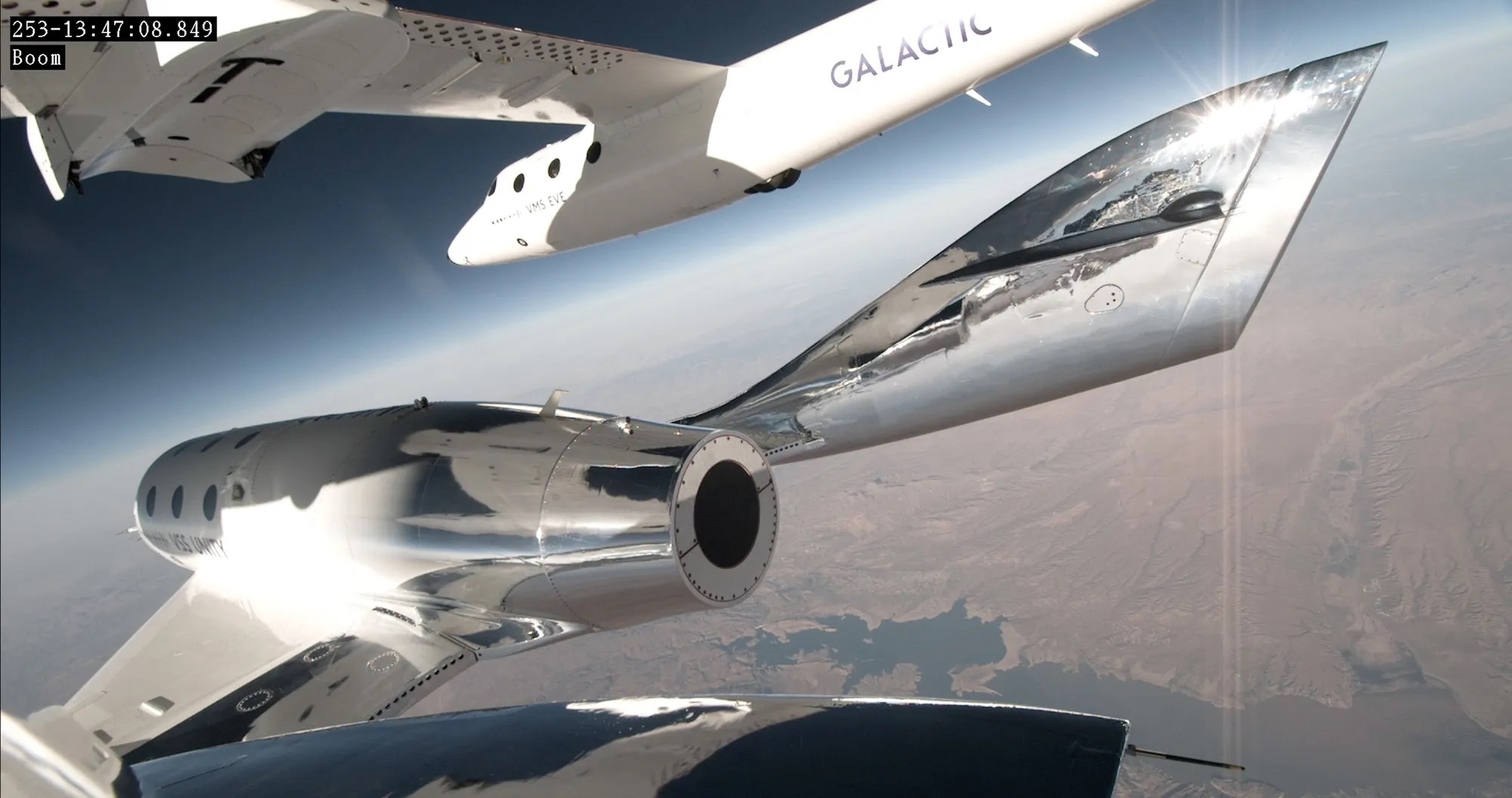28.04.2023

Virgin Galactic's VSS Unity spaceplane is released from its VMS Eve mothership on a glide flight in New Mexico April 26. Credit: Virgin Galactic
WASHINGTON — Virgin Galactic’s suborbital spaceplane flew freely for the first time in nearly two years April 26 on a glide flight that prepares the company for powered flights and commercial service.
The company’s SpaceShipTwo suborbital vehicle, VSS Unity, was carried aloft by the VMS Eve mothership aircraft flying out of Spaceport America in New Mexico. Unity released from the plane at 9:47 a.m. Eastern at an altitude of 14,300 meters and glided to a runway landing back at the spaceport nine minutes later.
Virgin Galactic pilots CJ Sturckow and Nicola Pecile were at the controls of VSS Unity during the test flight, while company pilots Kelly Latimer and Jameel Janjua were flying VMS Eve.
The flight was the first for Unity since its July 2021 suborbital spaceflight that carried Virgin Galactic founder Richard Branson and other company employees. Both Unity and Eve had undergone extensive overhauls since that flight, including upgrades to enable higher flight rates. Eve, which returned to Virgin’s Mojave, California, factory for the overhaul, flew back to Spaceport America Feb. 27.
“Releasing Unity for a glide flight today is one of the final steps towards commercial spaceline operations,” Mike Moses, president of spaceline missions and safety at Virgin Galactic, said in a statement after the flight. “The data from this validation flight will clear the way for our return to space and, ultimately, lead to the launch of commercial service.”
The next step for Virgin Galactic will be a powered test flight of VSS Unity with four company mission specialists joining two pilots on the flight “to assess the customer experience and ground-based training,” the company said. Virgin did not disclose a date for that flight but said it will analyze the data from this glide flight over the “coming weeks” before clearing Unity for a suborbital spaceflight.
That schedule, the company added, would keep Virgin Galactic on track to begin commercial service later in the second quarter. That first commercial flight will be a dedicated research flight for the Italian Air Force under a contract signed in 2019, carrying three Italian mission specialists who will conduct experiments during the suborbital flight.
Michael Colglazier, chief executive of Virgin Galactic, said in an earnings call Feb. 28 that he anticipated flying Unity once a month, but added it may take some time to achieve that flight rate. “There’s nothing specifically in our way of being at a monthly cadence. I think it’s just shaking out the operation and learning how to turn the ship on a consistent basis.”
Virgin Galactic has about 800 private astronauts signed up for flights, representing about $208 million in revenue, the company has said in Securities and Exchange Commission filings. Many of those customers may end up flying on the future Delta-class suborbital vehicles Virgin is developing and expects to start flying in 2026.
The company has another suborbital vehicle, VSS Imagine, in development that was originally intended to be part of a line of vehicles called SpaceShipIII. Colglazier said in the earnings call that work on Imagine had been put on hold to focus both on getting Unity and Eve flying again as well as ramping up production of the Delta-class vehicles. He said once both those efforts were in good shape “we’ll come pick up Imagine and see where we want to go.”
The Unity glide flight came one day after Virgin Galactic announced changes to its board of directors. The company said April 25 that it added Raymond Mabus, Jr. and Diana Strandberg to the board. Mabus is a former secretary of the navy and governor of Mississippi while Strandberg is a former executive with Dodge & Cox, a privately owned investment manager.
Evan Lovell, who has been on the board since 2019, became chair of the board as part of the changes. Lovell, chief investment officer for Virgin Group, had been acting chair of the board since February 2022. Two current board members, Adam Bain and George Mattson, will step down from the board at the end of their current terms and not run for reelection at the company’s next annual meeting.
Quelle: SN
